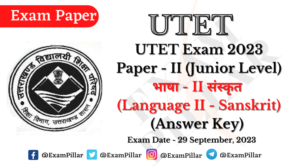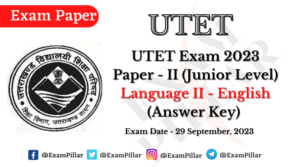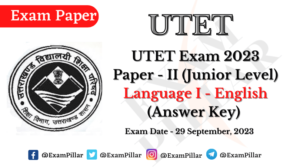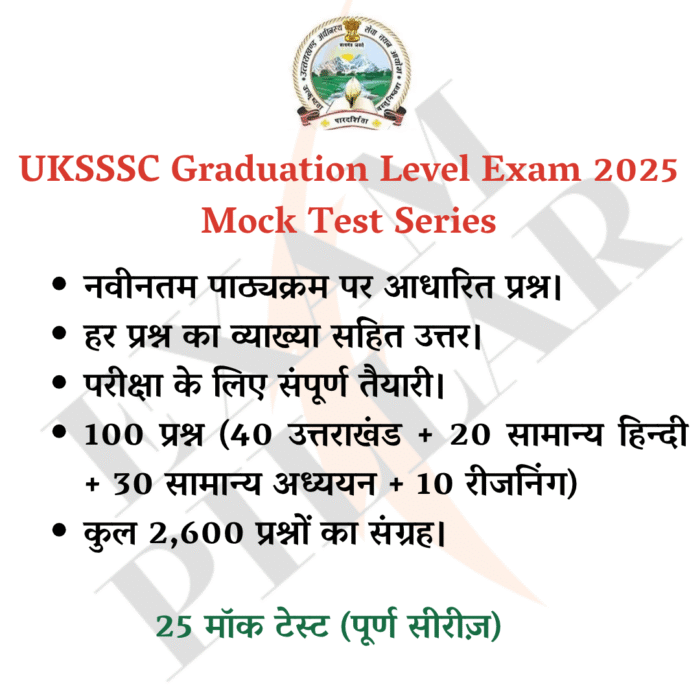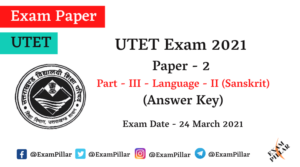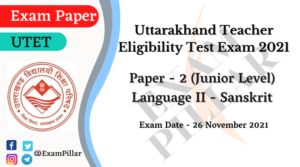UBSE (Uttarakhand Board of School Education) Conduct the UTET (Uttarakhand Teachers Eligibility Test) 2019 Exam on 06 November 2019. Here UTET Paper 2 Second Language – English Subject Paper with Answer Key.
Read Also …
- UTET Exam 2019 – Paper – 2 बाल विकास एवं शिक्षण विज्ञान
- UTET Exam 2019 – Paper – 2 भाषा प्रथम – हिंदी
- UTET Exam 2019 – Paper – 2 First Language – English
- UTET Exam 2019 – Paper – 2 भाषा द्वितीय – हिंदी
- UTET Exam 2019 – Paper – 2 भाषा द्वितीय – संस्कृत
- UTET Exam 2019 – Paper – 2 गणित एवं विज्ञान
- UTET Exam 2019 – Paper – 2 सामाजिक अध्ययन
UTET (Uttarakhand Teachers Eligibility Test) Junior Level
(Class 6 to Class 8)
Exam :− UTET (Uttarakhand Teachers Eligibility Test)
Part :− Second Language – English
Organized by :− UBSE
Number of Question :− 30
Exam Date :– 06th November 2019
UTET Exam 2019 Paper – 2 (Junior Level)
Second Language – English
61. Choose the word with correct spellings:
(A) remorsefull
(B) remorseful
(C) remorceful
(D) remorsiful
Show Answer/Hide
62. Intensive reading lays stress on mastery of :
(A) words
(B) grammar
(C) language
(D) usage
Show Answer/Hide
63. I told him that he couldn’t hope to catch a big ______ fish a small rod like that, but he insisted ______ trying.
(A) with, on
(B) by, about
(C) with, about
(D) by, on
Show Answer/Hide
64. Choose the correct option from the following:
(A) Where did you cut your hair?
(B) Where have you cut your hair?
(C) Where did you have cut your hair?
(D) Where did you have your hair cut?
Show Answer/Hide
65. Pronunciation drills are the excellent means of forming correct speech :
(A) Sound
(B) Intonation
(C) Skills
(D) Habits
Show Answer/Hide
66. One of the limitations of Language Laboratory is that it cannot be used to learn:
(A) writing and speaking
(B) listening and reading
(C) reading and writing
(D) speaking and listening
Show Answer/Hide
Direction (67 to 70): Read the pas given below and answer the question follow by selecting the most appropriate option :
The work which Gandhiji had taken up was not only the achievement of political freedom but also the establishment of a social order based on truth, non-violence unity and peace, equality and universal brotherhood and maximum freedom for all. This unfinished part of his experiment was perhaps even more difficult to achieve than the achievement of political freedom. In the political struggle, the fight was against a foreign power and all one could do, was either join it or wish it success and give it his or her moral support. In establishing the social order of his pattern there was a likely possibility of a conflict arising between groups and classes of our own people. Experience shows that man values his possessions even more than his life because in the former he sees the means of perpetuation and survival of his descendants even after his body is reduced to ashes. A new order can not be established without radically changing the mind and attitude of men towards property and at some stage or the other, the ‘haves’, have to yield place to the ‘have nots’. We have seen in our time, attempts to achieve a kind of egalitarian society and the picture of it after it was achieved. But this was done by and large, through the use of physical force.
The root cause of class conflict is possessiveness or the acquisitive instinct. So long as the ideal that is to be achieved is one of securing maximum material satisfaction, possessiveness is neither suppressed nor eliminated but grows on what it feeds. Nor does it cease to be such-it is possessiveness, still, whether it is confined to only a few or is shared by many.
If egalitarianism is to endure it has to be based not on the possession of the maximum material goods by few or by all but voluntary, enlightened renunciation of those goods, which can not be shared by others or can be enjoyed only at the expense of others. This calls for substitution of spiritual.
67. Apart from the political freedom for his country, Gandhiji wanted :
(A) a lot of wealth
(B) a big army
(C) economic freedom
(D) universal brotherhood
Show Answer/Hide
68. Man gives more importance to his possessions because through them he hopes to get :
(A) a chance to enjoy
(B) the welfare of his posterity
(C) a new social order
(D) perpetuation of his life
Show Answer/Hide
69. Man’s acquisitive instinct has given rise to :
(A) class conflicts
(B) an egalitarian society
(C) political freedom
(D) maximum material satisfaction
Show Answer/Hide
70. Find which phrase or word in the following means “a social system in which everyone has equal status and the same money and opportunities”:
(A) order of his pattern
(B) universal brotherhood
(C) egalitarian society
(D) acquisitive instinct
Show Answer/Hide
Direction (71 to 74): Read the passage given below and answer the questions that follow by selecting the most appropriate option :
Online social networking via mobile phones and computers is a global revolution. Around a billion people worldwide use networking to stay in touch with friends, to share videos and photographs and to exchange information. But, if you are using networking in this way, you should be aware of the risks that exist.
Social networking is such that most of the extensive numbers of users are unknown to you. This carries a degree of risks. Once a message, video or photo has been shared online, it is out of your hands because you can’t control where it goes. This means that you may be sharing your personal information with people you do not know and who may not be trustworthy.
Some vital points to consider in order to reduce risks, when using social networking include keeping personal details private; thinking carefully before posting, chatting, uploading or downloading and using privacy settings to restrict strangers accessing your information.
71. The main idea in paragraph three is that there are :
(A) several good reasons to avoid social networking.
(B) strangers who spy on the users of social networks.
(C) several times when you should use social notworking.
(D) ways to control the sharing of personal information.
Show Answer/Hide
72. The text refers to “the extensive numbers of users” in order to :
(A) persuade readers to join in.
(B) indicate social networking is worldwide.
(C) show there are lots of opportunities to make friends.
(D) suggest that large numbers increase the chance of danger.
Show Answer/Hide
73. Social networking is called ‘revolution’ because it :
(A) is a significant change
(B) is a political movement
(C) revolves around the globe
(D) causes conflict across society
Show Answer/Hide
74. Which of these sayings summarises the message within this passage?
(A) Freedom of speech is the noblest right
(B) Privacy is for people with something to hide
(C) People should use social networking with caution
(D) If you haven’t got anything nice to say, don’t say anything
Show Answer/Hide
75. Lexicologist means :
(A) One who writes essays
(B) One who composes poems
(C) One who studies the form, meaning and behaviour of words
(D) One who writes literary articles
Show Answer/Hide


